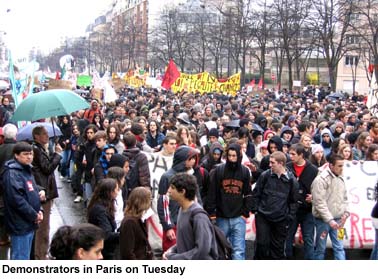Untitled Document
An estimated 2 to 3 million striking workers and students demonstrated
in cities and towns throughout France yesterday in opposition to the Gaullist
government’s “First Job Contract” (CPE—Contrat première
embauche) legislation, which permits employers to dismiss young workers without
cause or compensation during their first two years on the job.

The largest rally was held in Paris, where 700,000 people marched in cold and
wet conditions. Other large demonstrations were staged in Marseille, where organisers
reported that 250,000 people participated, Bordeaux (100,000), Toulouse (80,000),
Nantes (70,000), and Grenoble (60,000). The turnout was twice as large as that
for the previous national day of action against the CPE on Saturday, March 18.
Workers across a range of industries went on strike yesterday. Bus, railway,
and metro work stoppages affected public transport services in Paris and 75
other cities and towns. One third of all flights were cancelled and the rest
suffered delays as air traffic controllers and many Air France workers struck.
Other public sector workers on strike included teachers, hospital workers, and
energy workers at Gaz de France SA and Electricite de France SA. Strikes at
printing companies left France’s daily newspapers unpublished, while the
public news radio station France-Info broadcast pre-recorded music.
Private sector workers also stopped work in significant numbers and participated
in the demonstrations, including young workers striking for the first time.
Hundreds of thousands of high school and university students again marched throughout
France. The leading university students’ union, UNEF (l’Union Nationale
des étudiants de France), reported that 56 of France’s 84 universities
have been closed by the protests. One quarter of all high schools have also
been affected by ongoing student strikes.
The national demonstration underscored the depth of popular opposition to the
government of Prime Minister Dominique de Villepin and the determination of
the French people to defeat the government’s attack on workers’
conditions. Villepin and President Jacques Chirac—indeed the entire French
ruling elite—are extremely weak and isolated. According to an opinion
poll conducted by Le Monde and France2 Television, just 4 percent want the CPE
to be maintained unchanged, and only one third of respondents supported the
prime minister.
The crisis has raised the necessity for the anti-CPE movement to bring down
the ruling administration and replace it with a government that genuinely represents
the interests of French workers and youth. Such a struggle can only be advanced
on the basis of constructing a new independent and international socialist party
of the working class. At yesterday’s demonstration in Paris, supporters
of the World Socialist Web Site distributed thousands of copies of the WSWS
statement, “Fight vs. ‘First Job Contract’ raises need for
new working class leadership” http://www.wsws.org/articles/2006/mar2006/fran-m28.shtml,
which advanced this perspective.
As the statement stressed, a genuine struggle against the Chirac-Villepin administration
requires the working class to break from the entire French “left”—the
trade unions and Socialist and Communist parties, as well as the so-called “extreme
left” groups. These organisations have done everything in their power
to prevent the anti-CPE movement developing into a struggle against the government
and its right-wing agenda. Their primary concern is to preserve the stability
of the French state.
UNEF head Bruno Julliard, who has close ties to the Socialist Party, summed
up the position of the trade unions, social-democrats, and Stalinists on Europe
1 radio last Monday. “The call for the resignation of the government is
not a demand that I share because we are not organising a movement with the
aim of the resignation of the government,” the student union leader declared.
“I do not want to inflict a defeat on Dominique de Villepin—I’m
not interested in that.... At the end of this movement we do not want there
to be a loser or a winner. What we want is for there to be an end to this mobilisation.
We are asking for a discussion—neither side should lose face. Let’s
organise a way out of this crisis.”
The effort of the French “left” to prop up Villepin is a reflection
of the reality that the established parties have no genuine differences with
his programme. There is a consensus within the French political establishment
that the gains secured by working people in the decades after World War II must
be reversed and that the working class must be subjected to the discipline of
the “free market.” To maintain French capitalism’s international
competitiveness against rivals in the US, Europe, and Asia, wages and conditions
must be systematically driven down. The only point of debate is how to implement
the necessary measures without provoking mass opposition.
The need for workers and youth to break from the established “left”
and to develop their own independent socialist party is the task immediately
posed to the anti-CPE movement. The longer this is postponed, the greater the
danger that the movement will be betrayed and suppressed.
Villepin has maintained that the CPE will not be withdrawn. Speaking in the
National Assembly yesterday, he repeated his offer to negotiate changes to certain
aspects of the way in which legislation was implemented while refusing to rescind
the reform.
The crisis has led to calls from within the ruling elite for a fresh approach.
In a speech on Monday, Interior Minister Nicolas Sarkozy declared that “social
dialogue is an essential condition to the success of all reform,” and
called for a single employment contract for all age groups. “We have to
find a way which is not a retreat and at the same time allows the unions to
come back to the negotiating table,” Sarkozy’s advisor Eric Woerth
explained. Laurence Parisot, head of the business group MEDEF, said yesterday
that she would not be opposed to the suspension of the CPE. France’s Constitutional
Council, which will rule on the legality of the CPE tomorrow, may strike down
the legislation, thereby allowing the government to regroup and redraft the
legislation in another form.
The trade unions, together with the Socialist and Communist parties, would
no doubt proclaim such a ruling as a great victory and use it to wind up the
anti-government demonstrations and strikes. But in fact, neither the withdrawal
of the CPE nor the replacement of Villepin with another figure from the political
establishment would of itself signify the defeat of right-wing attacks on workers’
conditions.
The government has meanwhile stepped up police repression of the anti-CPE demonstrations.
Sarkozy met with senior police officers before yesterday’s protest and
instructed them to “arrest as many thugs, that means delinquents, as you
can.” Thousands of police were mobilised across the country, including
4,000 in Paris. Officers reportedly searched and detained large numbers of youths
from the capital’s impoverished suburbs arriving at the demonstration.
There were further incidents reported of violence and theft by groups of casseurs
(“hooligans”) as well as clashes between police and small sections
of the demonstrations in Paris and other cities. Riot police used tear gas in
Paris, Rouen, Grenoble, and other cities. Authorities reported that 387 predominantly
young people were arrested yesterday, more than half in Paris.
WSWS reporters spoke with a number of workers and students at the demonstration
in Paris.
“My high school, the lycée Dorian has been blockaded for a week now,”
Vincent Assailly said. “The majority of the students are quite actively
involved. It’s an excited atmosphere.
“Villepin doesn’t want to let go, but now he’s going to have
to do something when faced with such a big mobilisation. For the moment, I think
he’s bluffing. He’s scared, he doesn’t want to lose face,
but he’s going to have to give ground because it’s the survival
of the government that’s at stake.
“Many of the people who’re demonstrating today know that it’s
necessary to go beyond the CPE. They reject the logic of the market, which sees
us as commodities, always fattening the shareholders at our expense. It may
not be the majority, but there’s a part of the movement that would like
to take the struggle further. Not just the youth, but workers as well, reject
insecurity in general. Indeed, if you want to finish with our lives being commodities,
you are going to have to make a radical break with the capitalist system. That’s
not what all the demonstrators think—it’s what I think.
“There’s a cruel lack of coordination between the different movements.
All over the world countries are looking inwards, concerned with their own problems,
it’s a shame. We can talk on a national basis—but locally we are
not organised enough. We must create networks starting from these sections and
then do things globally. The key, if we really want to contain the plagues afflicting
our world, is to create public services on a world scale—real social services,
not just stamps for the post office, but also for food, housing, culture. That
would enable the inhabitants of the earth to face tomorrow without fear. That’s
essential. That’s the issue we must measure up to.”
 |
Matthieu Grimbert, a young information technology worker employed in the private
sector, also spoke with the WSWS. “I’ve been a worker now for five
years,” he said. “I’ve come today to support the youth, to stop
them having to live in insecurity that is getting worse in France. This is the
first time we’ve been called out on strike on the CPE question, the first
time I’ve gone on strike since I started work.
“This struggle involves far more than just the CPE, it goes against the
world situation and even the situation in France—a country that is in
constant decline. They’re always hitting at work rights and social gains.
We can’t allow them to do that—more and more of us are going to
have job insecurity, either unemployed or on short-term contracts. That’s
why we’re demonstrating—to make the government back down on the
CPE. But that involves much more than the CPE.
“I completely agree with the National Student Coordination in calling
for a general strike. We have everything to play for now. I agree with the calling
for the resignation of the government. It wouldn’t listen to us young
people, and it’s more and more out of step with the country. I don’t
think the government even without Villepin would do anything but act in its
own interests and the interests of the bosses, so the government must go. They
try to make us think that the economy governs the country and governs the politicians.
I think and I believe that that’s not the case. I want the politicians
to be able to bang on the table and say ‘no, it’s not the economy
that runs the country, something can be done about it.’ In 10 or 20 years,
all there will be is insecurity, an enormous rate of unemployment throughout
Europe. It’s not a French problem but a European problem.
“In 2002, unfortunately I voted for Chirac. I regret it bitterly. Chirac’s
had a terrible term in office. If I had been older and more experienced, I would
have supported your campaign for an active boycott independent of the political
establishment in France. I was in a situation where I wasn’t really given
a choice. I found myself in a situation where I felt I had to vote for Chirac
in spite of everything. If I had had another alternative, I would have grabbed
it.”

